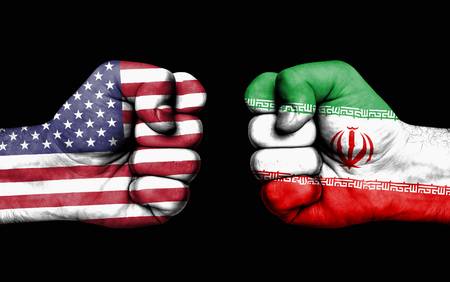Oil prices made a spectacular comeback Thursday as fresh US-Iran tensions erupted, also helping equities advance after US labour market figures provided a glimmer of hope for the world’s top economy.
At one point the US crude oil benchmark WTI was up by 20 percent on the day, having earlier this week plunged below zero.
“Heightened risk in the Middle East” triggered the upturn, said analysts at Phillip Futures, after US President Donald Trump tweeted he had “instructed the United States Navy to shoot down and destroy any and all Iranian gunboats if they harass our ships at sea”.
Iran, meanwhile, said it put its first military satellite into orbit. Washington alleges the space programme is a cover to develop ballistic missiles.
Short of halting the world’s oil production there is little producers can do to help the oil price, said Ipek Ozkardeskaya, Senior Analyst at Swissquote Bank.
“One other option is to fuel geopolitical tensions in the Middle East to threaten supply and support prices. This is what Donald Trump is doing right now,” she said.
The tensions offset news of another surge in US crude stockpiles as the pandemic crushes demand for energy.
“Oil prices are enjoying another little bounce on Thursday but don’t be fooled, at these levels, the percentage change can be very misleading,” cautioned Craig Erlam, an analyst at Oanda.
Things were looking up “as the price doesn’t start with a minus”, he said, “but I wouldn’t bet against visiting those depths again”.
– ‘Unprecedented’ collapse –
Equity markets meanwhile were posting solid gains by the late European afternoon, partly because of higher oil prices, and partly because US unemployment claims rose by less than the market had expected, said analysts at Charles Schwab.
“Jobless claims spiked again but at a rate that was below forecasts,” they said.
But although traders were willing to put their worries for the world economy to one side, the underlying picture appeared dismal.
The eurozone economy headed by Germany is suffering an “unprecedented” collapse according to a PMI index released Thursday by analysis firm IHS Markit.
The company’s purchasing manager’s index (PMI) dived to a record low in April, confirming private sector gloom that is savaging the 19-nation eurozone.
Meanwhile, the Bank of England warned that Britain was heading for a recession that could be the worst in centuries.
Markets were not too hopeful as they looked to a meeting of EU leaders who were expected to hammer out a plan to help their economies, but not without much bickering.
In a further sign of the battle ahead for governments, a gauge of Japan’s services sector on Thursday came in at a record low for April and pointed to a deep contraction, while a measure of factory activity dropped to its lowest since the financial crisis 11 years ago.
Data showed South Korea’s economy contracted 1.4 percent in January-February, its worst number since 2008.
– Key figures around 1540 GMT –
West Texas Intermediate: UP 29.5 percent at $17.85 per barrel
Brent North Sea crude: UP 10.1 percent at $22.43
London – FTSE 100: UP 1.0 percent at 5,826.61 points (close)
Frankfurt – DAX 30: UP 1.0 percent at 10,513.79 (close)
Paris – CAC 40: UP 0.9 percent at 4,451.00 (close)
EURO STOXX 50: UP 0.6 percent at 2,852.46
New York – Dow: UP 1.0 percent at 23,719.96
Tokyo – Nikkei 225: UP 1.5 percent at 19,429.44 (close)
Hong Kong – Hang Seng: UP 0.4 percent at 23,977.32 (close)
Shanghai – Composite: DOWN 0.2 at 2,838.50 (close)
Euro/dollar: DOWN at $1.0818 from $1.0822 at 2100 GMT
Dollar/yen: DOWN at 107.66 yen from 107.71
Pound/dollar: UP at $1.2374 from $1.2320
Euro/pound: DOWN at 87.43 pence from 87.82
AFP

 Join Daily Trust WhatsApp Community For Quick Access To News and Happenings Around You.
Join Daily Trust WhatsApp Community For Quick Access To News and Happenings Around You.


